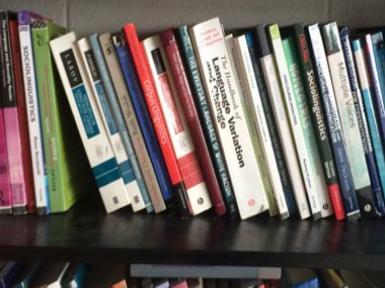Projects in Teaching Linguistics: Burden or Opportunity?
OVERVIEW

| MODULE TITLE: | Sociolinguistics 2 |
|---|---|
| MODULE COORDINATOR: | Professor Bettina Migge |
| MODULE CODE: | LING 20090 |
| TARGET AUDIENCE: | Second year students in BA (Arts & Humanities); Majoring in Linguistics |
BACKGROUND
Sociolinguitics 2 is a second year core module in the BA major in Linguistics. Every year this module is taken by about 75 students in semester one. The principal aim of the module is to introduce students to language variation and change and to data collection and analysis methods in quantitative approaches to sociolinguistics.
This module is often considered to be challenging by students because it requires and simultaneously develops knowledge about the structure and functioning of society and language, basic descriptive statistics, and critical analysis and pattern recognition skills.
Additional issues that negatively affect the effective teaching and learning in this module are that many students, at this stage, are not able to identify and critically assess society-wide negative social stereotypes about language variation and change and are reluctant to take part in in-class discussions generally and about socially sensitive issues in particular. Furthermore, there is a lack of published teaching materials on variation and change that deal with Ireland.
GOALS
The goals of this approach are to:
- identify instances of language variation in Ireland
- examine the differences between social and regional variation
- learn to develop hypotheses about the social reasons for variation (in Ireland)
- identify suitable data & methods to collect and investigate instances of variation and change
- introduction to both data collection & analysis methods in linguistics
- develop critical analysis skills
- be able to coherently present a small scale study in a presentation & in writing
THE INNOVATIVE APPROACH
Students are asked to get together in groups of three or four, to identify one instance of social variation in Ireland that is suitable for quantitative analysis, to determine appropriate data types and data collection methods, and to examine in detail the identified instance of socially based language variation.
The findings of the project have to be presented in a five minute powerpoint presentation towards the end of the semester. The presentation will be rated by the lecturer and students are asked to ask critical questions. The group also has to provide a final write up of the project (about three pages).
In order to help students identify instances of social language variation, students are encouraged to brainstorm and discuss instances of variation noticed by them for a few minutes at the beginning of classes in the initial weeks of the semester. Once groups have identified instances of variation to work on, a five minute discussion about methods takes place at the beginning of class. Since students often do not have much experience with project work, they are provided with basic guidelines and which they discuss in tutorials.
A few weeks into the semester, each group has to submit a one page outline of their project on which the lecturer provides comments. Prior to the commencement of presentations, students are also provided with a generic sample powerpoint so that they have a clear idea of what they have to talk about. To encourage discussion, each group has to formulate questions about at least two presentations.
RESULTS
- Students learn to make deeper connections between local practices and abstract academic concepts and processes through a hands-on approach.
- Students start to reassess existing social stereotypes and local practices which, over time, will lead to destigmatization.
- The free choice of projects and methods allows students to validate their own interests and life-worlds.
- The lecturer is able to discover students’ life-worlds and interests and to refer to them for their own teaching; by more closely aligning illustrations of concepts etc. to the experiences of the students, the latter are more easily able to understand them.
- Students who are not able to express themselves well in exams and other written assignments but have very good practical and oral skills are able to shine.
- Students who are able to talk in front of the class learn to overcome their fears and feel empowered.
- Shy students are forced to connect with other students and sometimes build networks for other activities at UCD and in other domains of their lives.